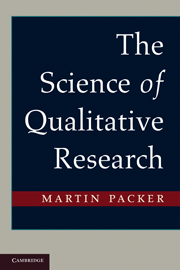Book contents
- Frontmatter
- Contents
- List of Figures and Tables
- List of Boxes
- Acknowledgments
- Introduction
- Part I The Objective Study Of Subjectivity
- Part II Ethnographic Fieldwork – The Focus On Constitution
- Part III Inquiry With An Emancipatory Interest
- 11 Qualitative Research as Critical Inquiry
- 12 Emancipatory Inquiry as Rational Reconstruction
- 13 Social Science as Participant Objectification
- 14 Archaeology, Genealogy, Ethics
- 15 A Historical Ontology of Ourselves
- References
- Name Index
- Subject Index
15 - A Historical Ontology of Ourselves
- Frontmatter
- Contents
- List of Figures and Tables
- List of Boxes
- Acknowledgments
- Introduction
- Part I The Objective Study Of Subjectivity
- Part II Ethnographic Fieldwork – The Focus On Constitution
- Part III Inquiry With An Emancipatory Interest
- 11 Qualitative Research as Critical Inquiry
- 12 Emancipatory Inquiry as Rational Reconstruction
- 13 Social Science as Participant Objectification
- 14 Archaeology, Genealogy, Ethics
- 15 A Historical Ontology of Ourselves
- References
- Name Index
- Subject Index
Summary
Foucault’s great achievement in my view was to see, and show, how we can have a history of this [self-constituting freedom]: that by describing the different techniques of the self, one can tell the story of different ways in which people have purposefully made themselves into certain kinds of persons, and therefore of the historically specific and definite (and of course always limited) forms which ethical freedom has taken.
Laidlaw, 2002, p. 324My principal aim in this book has been to consider how social scientists can frame and answer questions that are important and relevant. We have examined typical practices with the tools of qualitative research – interviews, ethnographic fieldwork, and analysis of discourse – with an eye toward their embedded ontological and epistemological assumptions. We have found a recurrent ontological dualism of subject and object, and an epistemology that contrasts subjective experience with objective knowledge. But we have also found important attempts to use these tools in new ways.
Dissolving Kant’s Problem
In Part I, I argued that much qualitative research remains stuck in the dualism of subject and object. We began our examination of the practices of qualitative research with the semistructured interview, commonly viewed as central to the objective study of subjectivity, a view that Steiner Kvale summarized well: “If you want to know how people understand their world and their life, why not talk with them?” I questioned the combination of invisibility and confession in the qualitative research interview, and the practices of abstraction and generalization that are central to analysis through coding. The conduit metaphor for language, the view that meaning is contained in concepts and that experience is expressed in talk, contributes to a dualistic opposition between subjectivity and objectivity that ties this kind of research in knots. This approach maintains the same ontological dualism as empirical-analytic inquiry and ignores intersubjective phenomena: the material practices that form a background to our everyday actions and experiences. We began to consider different ontological assumptions and commitments, looking for the basis of a genuinely new program of inquiry in the social sciences. I suggested that when we interview a person we don’t simply test our theories about them or find answers to our questions but encounter them and are challenged by them. We change, we learn, we grow. When we analyze an interview transcript, we should articulate our understanding of it as an invitation to see a different form of life.
- Type
- Chapter
- Information
- The Science of Qualitative Research , pp. 378 - 396Publisher: Cambridge University PressPrint publication year: 2010



